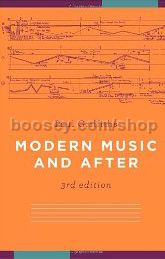Modern Music and After
Modern Music and After
* Estimated price converted from UK retail price
Over three decades, Paul Griffiths's survey has remained the definitive study of music since the Second World War; this fully revised and updated edition re-establishes Modern Music and After as the preeminent introduction to the music of our time. The disruptions of the war, and the struggles of the ensuing peace, were reflected in the music of the time: in Pierre Boulez's radical reformation of compositional technique and in John Cage's development of zen music; in Milton Babbitt's settling of the serial system and in Dmitry Shostakovich's unsettling symphonies; in Karlheinz Stockhausen's development of electronic music and in Luigi Nono's pursuit of the universally human, in Iannis Xenakis's view of music as sounding mathematics and in Luciano Berio's consideration of it as language. The initiatives of these composers and their contemporaries opened prospects that haven't yet stopped unfolding.
This constant expansion of musical thinking since 1945 has left us with no singular history of music; Griffiths's study accordingly follows several different paths, showing how and why they converge and diverge. This new edition of Modern Music and After discusses not only the music of the fifteen years that have passed since the previous edition, but also the recent explosion of scholarly interest in the latter half of the twentieth century. In particular, the book has been expanded to incorporate the variety of responses to the modernist impasse experienced by composers of the 1980s and 1990s. Griffiths then moves the book into the twenty-first century as he examines such highly influential composers as Helmut Lachenmann and Salvatore Sciarrino.
For its breadth, wealth of detail, and characteristic wit and clarity, the third edition of Modern Music and After is required reading for the student and the enquiring listener.
Features:
Provides the most comprehensive study in English of musical composition from 1945 onwards.
Offers a keen examination of how important composers have responded to the constant flux of their cultural environs, both socially and technically.
Griffiths is considered by many in the field the finest writer on modern "classical" music in the English language today.
Reviews:
Praise for the first edition:
"As impressive for its accuracy, as for the clarity, acumen, and wit of its writing."--Classical Music
"Griffiths is excellent about a whole host of composers he admires....Any reader, enthusiast or specialist, will find much to interest and provoke. This book is probably the best of its kind in English today."--Ian Pace, Tempo: Quarterly Review of Modern Music
"Griffiths is so fluent, so practiced a writer in this field that it is understandable if the closest he gets to sceptical disengagement is in suggesting that a composer leaves critics, and even musicologists, lost for words."--Arnold Whittall, The Musical Times
"[A] marvellously thought-provoking and engaging text."--The Musical Times
"A must for the student, and also for the general reader."--The Times
"Modern Music and After remains as close a definitive survey, study, guide and analysis to its field as there is; it can be recommended without reservation...For a comprehensive, readable, authoritative, entertaining, lively, open-minded and all round well-written book on the development of music in our time, there is no better." --Classical.net
"Griffiths has done an outstanding job of making this music at least intellectually accessible. It is our job as listeners, if we seriously care, to seek it out and try to encounter it on its own terms. Highly recommended for libraries with sections on new music, composition, music theory and contemporary aesthetics/philosophy." --Music Media Monthly
"Modern Music and After remains as close a definitive survey, study, guide and analysis to its field as there is; it can be recommended without reservation. The standards of scholarship and authorship are indeed high....Production standards, are of course, high; and the price is beyond reasonable -- that alone should convince you to buy this third edition, even if you've read the earlier one(s).. the updates and referencing are significant. For a comprehensive, readable, authoritative, entertaining, lively, open-minded and all round well-written book on the development of music in our time, there is no better." --Classical.net
Product Details:
480 pages; 100 musical examples; 6-1/8 x 9-1/4; ISBN13: 978-0-19-974050-5
ISBN10: 0-19-974050-X
About the Author:
Paul Griffiths is an acclaimed writer on contemporary and classical music whose books include A Concise History of Western Music and The Penguin Companion to Classical Music. He is also known as a librettist (Elliott Carter's What Next?) and novelist. In 2002, Griffiths was honored by the French government as a Chevalier de l'Ordre des Arts et des Lettres.




